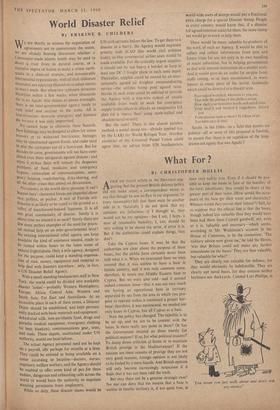World Disaster Relief
By ERSKINE B. CHILDERS
u are shortly to witness the negotiation of
agreements not to contaminate the moon; We are already hearing discussion whether a Communist-made atomic bomb may be used to divert a river from its natural course, or a capitalist engine of fission to make a minor earth- quake in a shale-oil stratum; and innumerable international organisations, with all their elaborate structures, are applying themselves to adapt nature to man's needs. But when two typhoons devastate Mauritius within a few weeks, when thousands die in an Agadir that shakes to pieces overnight, there is no inter-governmental agency ready to rush relief and succour to the scene. All is improvisation—however energetic; and humans die because it was only improvised.
We cannot hope to eliminate these hazards. New buildings may be designed to allow for minor tremors or to withstand hurricanes; barrages may be constructed against floods, and radar used to plot the cyclopean eye of a hurricane. But for decades to come, governments will not have com- pleted even these safeguards against disaster; and when it strikes there will remain the desperate problems of food, medicine and emergency hygiene, restoration of communications, emer- gency housing, road-clearing, dyke-shoring, and all the other crises that attend on devastation.
No country in the world dares presume `it can't happen here'; elemental forces are impartial about race, politics, or pocket. A nest of Florida mil- lionaires is as likely to be razed to the ground as a valley of matchwood-housed Japanese. It is all one great commonalty of disaster. Surely it is about time we treated it as such? Surely there are few more perfect examples of the need for practi- cal mutual help on an inter-governmental level? No existing international relief agency can keep available the kind of assistance needed, ready to be rushed within hours to the latest scene of natural frightfulness. Only a new agency, designed for the purpose, could keep a standing organisa- tion of men, money, equipment and material to help deal with disasters anywhere : only, in fact, a UN Disaster Relief Agency.
With a small standing headquarters staff in New York, the world could be divided into workable disaster `zones'—probably Western Hemisphere; Europe; Africa; Central Asia; Western and South Asia; Far East and Australasia. At an accessible place in each of these zones, a Disaster Depot should be established, and kept perman- ently stocked with basic materials and equipment : dehydrated milk, non-perishable food, drugs and Portable medical equipment, emergency clothing (at least blankets), communications gear, tents, and tools. These depots, maintained under UN authority, would use local labour.
The actual Agency personnel need not be kept °n a payroll, idle perhaps for months at a time. They could be enlisted as being available on a roster according to location—doctors, nurses, engineers welfare workers, and the Agency should be enabled to offer some kind of pay for these sudden, dangerous and exhausting calls across the world (it would have the authority to negotiate standing permission from employers).
While on duty, these disaster teams would be
UN civil servants before the law. To get them to a disaster in a hurry, the Agency would negotiate priority with ICAO (the world civil aviation body), so that commercial airline seats would be made available. For the critically urgent supplies, it should not he too heavy a burden to keep at least one DC-3 freight plane at each zone depot. Thereafter, supplies could be moved by an inter- nationally agreed air freighter commandeering service--the airlines being paid agreed rates. Navies in each zone could be enlisted to provide the Agency with a trip-wire system of vessels available from week to week for emergency supply trains (there is already an imaginative US plan for a 'mercy fleet' using moth-balled and obsolete naval vessels).
But the cost? There is one almost painless method, a postal stamp tax—already applied (i.e. by the U AR) for World Refugee Year. Member countries of the Universal Postal Union could agree that, on advice from UN headquarters, world-wide users of stamps would pay a fractional extra charge for a special Disaster Stamp. People in every country would know that, if a disaster (of agreed minimal scale) hit them, the same stamp tax would go to work to help them.
There would be many valuable by-products of the work of such an Agency. It would be able to collect and collate information from past and future crises for use not only in its own handling 01 major calamities, but in helping governments to deal with internal dislocation on a smaller scale. And it would provide an outlet for surplus food- stuffs rotting, or at least unconsumed, in ware- houses in many parts of the world; foodstuffs which could be diverted to a disaster area.
Poor naked wretched, wheresoc'er you arc, That bide the pelting of this pitiless storm, How shall your houseless heads and unfed sides, Your loop'd and window'd raggedness, defend you From seasons such as these? 0, 1 have ta'en Too little care of this!
Surely, in the 1960s—in a field that knows no politics—all or most of this proposal is feasible, to ensure that there is no repetition of the long- drawn-out agony that was Agadir?










































 Previous page
Previous page